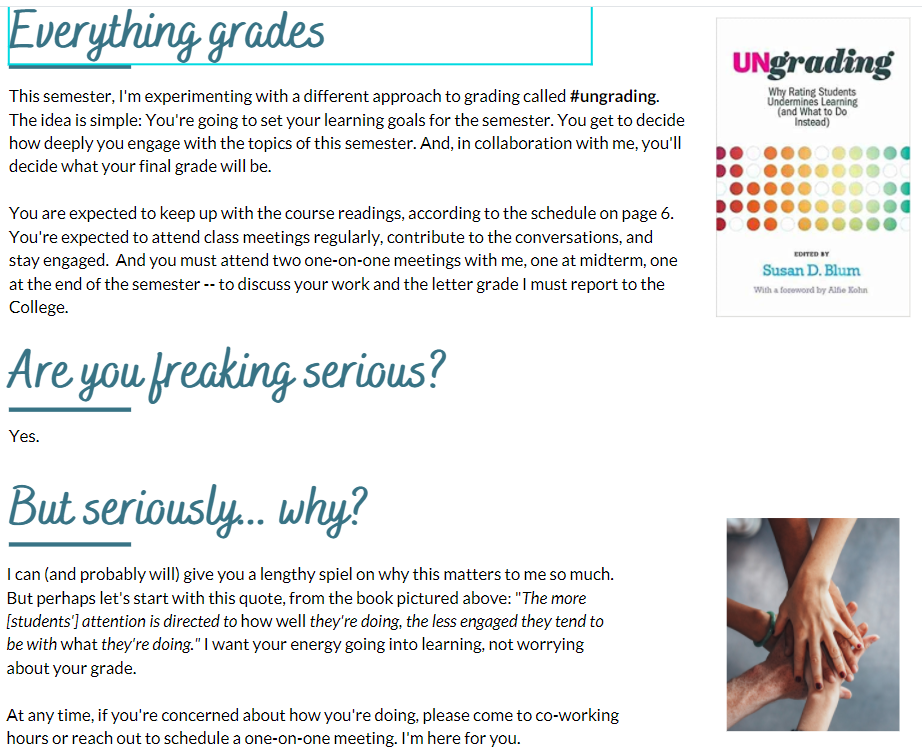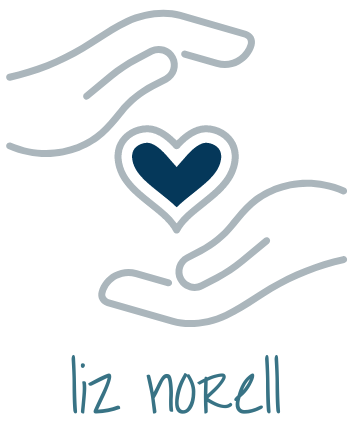Over my winter break, I read Ungrading, a collection of essays on the hows and whys of implementing this feedback-centered pedagogy in college classes (edited by the brilliant Susan Blum). It was then hot off the presses, and I devoured the book in a matter of a few days, armed with a highlighter, a stack of multicolored page flags, and a writing implement to make margin notes.
We were on a family vacation at an Airbnb on Edisto Island, SC; unable to travel to see family (because #COVID, of course), we escaped for five days of what our family does best on vacation — namely, reading books, watching TV, going for a daily walk, and eating great food. I also used the break from normal to write a couple of essays of my own (not about ungrading), but mostly I was letting my brain rest after a frenetic semester of pandemic-necessitated virtual teaching.
My much cooler and progressive colleague Bill had told me bits and pieces about ungrading over the years, but I’d pretty much always dismissed this as … well, Bill. I couldn’t fathom that something as subversive as refusing to assign grades to student work could be anything except a total disaster.
But thanks to earlier pandemic reading (most especially Kevin Gannon‘s incredible book, Radical Hope: A Teaching Manifesto), I was well-primed to embrace the lessons of the ungrading movement. Gannon preaches a pedagogy of trust and engagement, one that minimizes draconian rules and maximizes the humanity of all in the classroom. (It’s worth noting that he, like many others I’ve come to see as my intellectual heroes, draws heavily from Paulo Friere’s Pedagogy of the Oppressed).
I was participating in a pilot study on faculty/student engagement this spring, which meant going fully ungraded in my core class (American government, which I teach 9-11 sections of annually, on average) would potentially introduce confounding variables to the collection of data from my classes. That meant I couldn’t fully embrace the pedagogies I encountered in Blum’s edited volume … but it didn’t preclude me from doing so in my single section of Comparative World Politics.
In I jumped! My syllabus alerted students to this new approach thusly:

At midterm, I asked students to spend some time filling out a short self-evaluation form reflecting on their contributions to and takeaways from the first half of the semester, then scheduling a very short (15 minutes or less) conversation with me to review. When they assessed their own work, I was heartened at how closely my perception matched their own take on what grade would seem appropriate. I said nothing; I merely nodded and wrote it down.
At the end of the semester — last week, in fact — I repeated this process. I asked questions such as, “What was the most important-to-you thing you’ll take from this class?” and “How satisfied are you with how you contributed to the learning environment of the course?” I then asked each student, in a one-on-one conference, to assign themselves a grade.
One student in particular, a young woman in the college’s honors program, balked. “What grade do you think I’ve earned?”
Me: “I think you’ve earned whatever grade you feel comfortable assigning yourself.”
Student (in a high-pitched and soft voice): “But I don’t want a grade unless I’ve earned it…”
Me: “I can’t crawl inside your brain and see what’s different now from when we began in January. Even if I could, I wouldn’t. That’s creepy.”
Student (nervous laughter): “That’s true.”
Me: “I need you to do that investigating and report to me what you discover.”
Student: <long pause>
“I think I would say an A?”
Me: “OK. I hear some hesitancy, and I’m wondering what that’s about?”
Student: “I just am not sure if you agree…?”
Me: “I agree with whatever you feel represents your investment in and learning with this course.”
…
This conversation might have gone on forever, had I let it. But it underscored for me the biggest takeaway *I* had from a tentative exploration of ungrading: Students won’t own their learning if we constantly ask them to accept our assessment as the gospel. And students who don’t own their learning won’t know how to keep doing it when we’re not there anymore.
For all the scary potential for ‘gaming the system’ critics of ungrading see, there’s just as much scary potential for never developing agency as a learner if we don’t do it.
If you are keen to explore more, pick up Blum’s book … and if you want to explore a bit beforehand, I couldn’t more strongly recommend the abundant resources on Jesse Stommel’s excellent web site.
Come back soon for more installments of the #100DaysToFall series.






